HR Skills, Performance Management, and High-Performance Workplaces
VerifiedAdded on 2020/11/23
|19
|6188
|310
Report
AI Summary
This report delves into the essential professional knowledge, skills, and behaviors required by HR professionals, emphasizing communication, conflict management, and ethical conduct. It analyzes a personal skills audit, identifying strengths, weaknesses, opportunities, and threats to create a comprehensive professional development plan. The report further explores the differences between organizational and individual learning, highlighting the need for continuous learning and professional development. It demonstrates how high-performance workplaces (HPW) contribute to employee engagement and competitive advantage, evaluating various performance management approaches. The report uses the Whirlpool HPW case study to illustrate these concepts, addressing the annual Confederation of British Industry workshop's focus on performance management, collaborative working, and effective communication. The report aims to provide HR insights, analyzing the benefits of applying HPW and evaluating different performance management approaches.
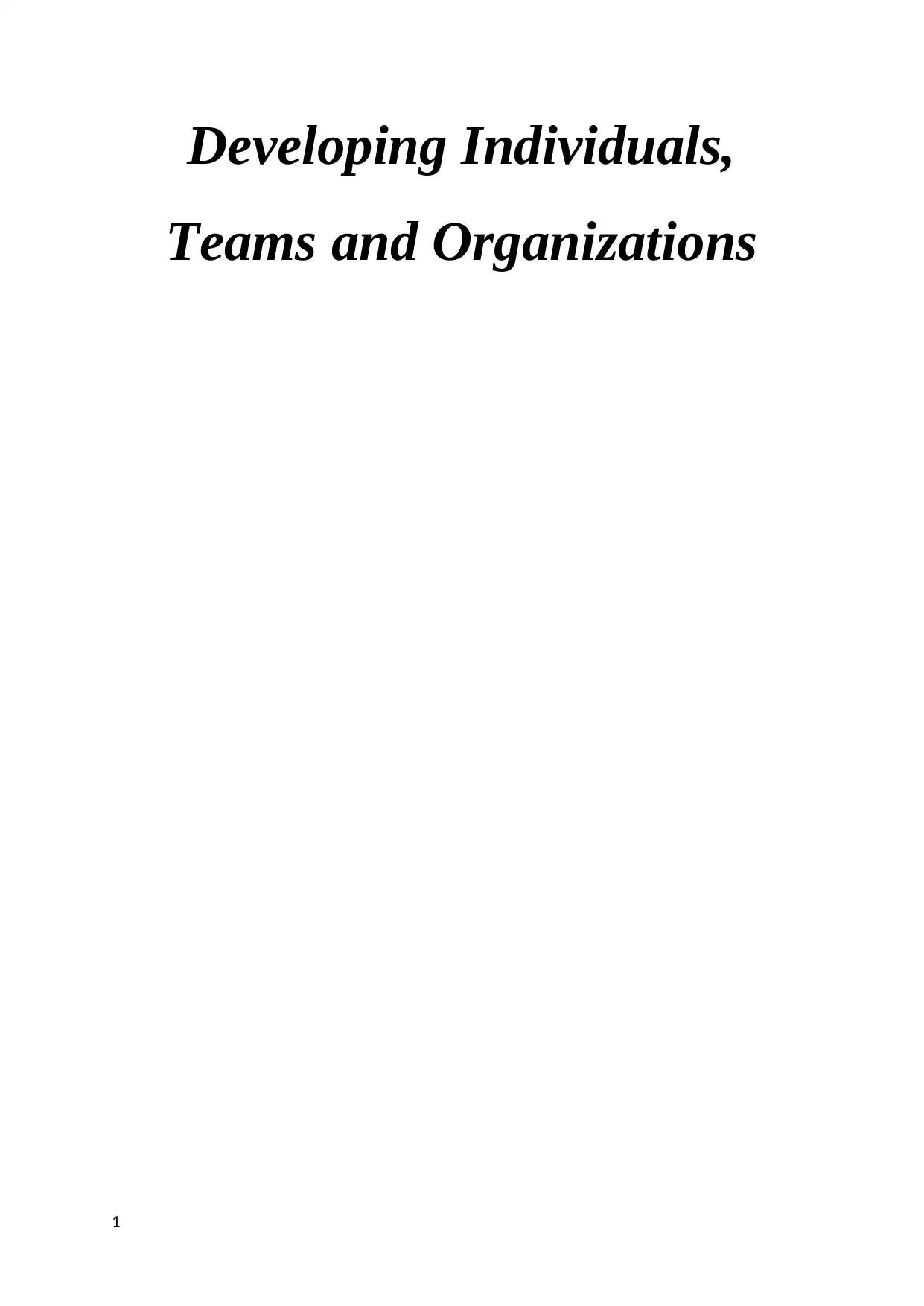
Developing Individuals,
Teams and Organizations
1
Teams and Organizations
1
Paraphrase This Document
Need a fresh take? Get an instant paraphrase of this document with our AI Paraphraser
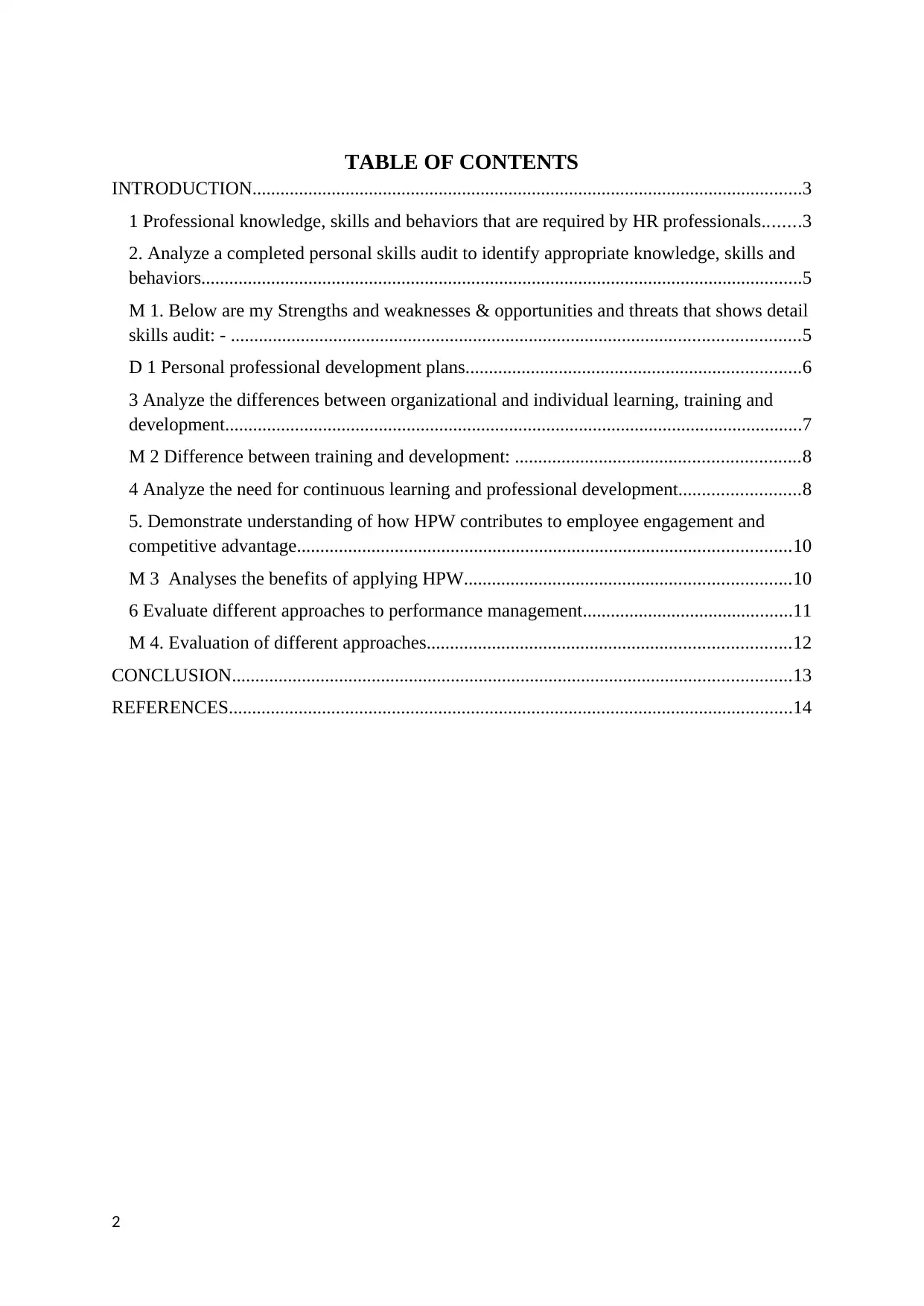
TABLE OF CONTENTS
INTRODUCTION......................................................................................................................3
1 Professional knowledge, skills and behaviors that are required by HR professionals........3
2. Analyze a completed personal skills audit to identify appropriate knowledge, skills and
behaviors.................................................................................................................................5
M 1. Below are my Strengths and weaknesses & opportunities and threats that shows detail
skills audit: - ..........................................................................................................................5
D 1 Personal professional development plans........................................................................6
3 Analyze the differences between organizational and individual learning, training and
development............................................................................................................................7
M 2 Difference between training and development: .............................................................8
4 Analyze the need for continuous learning and professional development..........................8
5. Demonstrate understanding of how HPW contributes to employee engagement and
competitive advantage..........................................................................................................10
M 3 Analyses the benefits of applying HPW......................................................................10
6 Evaluate different approaches to performance management.............................................11
M 4. Evaluation of different approaches..............................................................................12
CONCLUSION........................................................................................................................13
REFERENCES.........................................................................................................................14
2
INTRODUCTION......................................................................................................................3
1 Professional knowledge, skills and behaviors that are required by HR professionals........3
2. Analyze a completed personal skills audit to identify appropriate knowledge, skills and
behaviors.................................................................................................................................5
M 1. Below are my Strengths and weaknesses & opportunities and threats that shows detail
skills audit: - ..........................................................................................................................5
D 1 Personal professional development plans........................................................................6
3 Analyze the differences between organizational and individual learning, training and
development............................................................................................................................7
M 2 Difference between training and development: .............................................................8
4 Analyze the need for continuous learning and professional development..........................8
5. Demonstrate understanding of how HPW contributes to employee engagement and
competitive advantage..........................................................................................................10
M 3 Analyses the benefits of applying HPW......................................................................10
6 Evaluate different approaches to performance management.............................................11
M 4. Evaluation of different approaches..............................................................................12
CONCLUSION........................................................................................................................13
REFERENCES.........................................................................................................................14
2
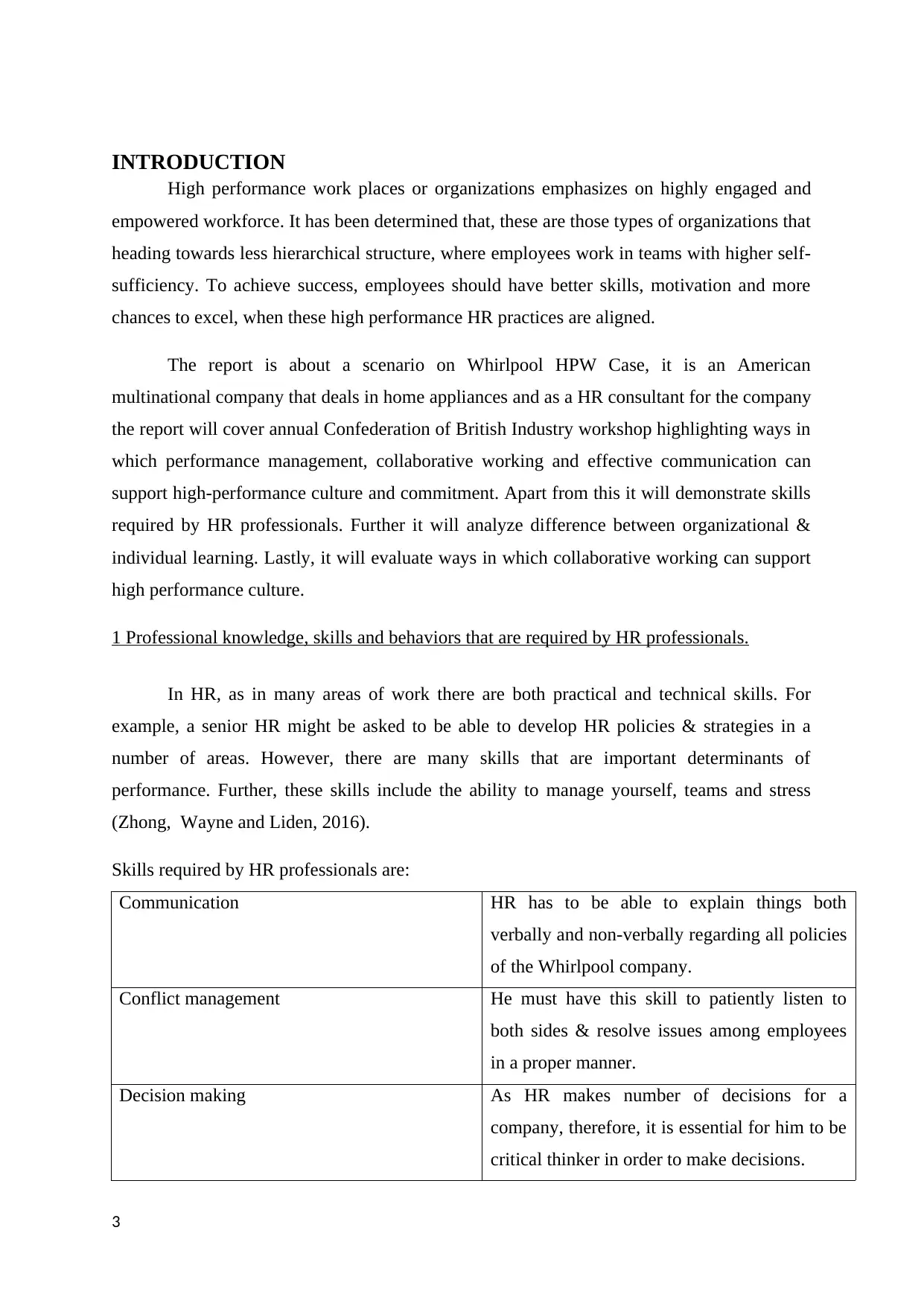
INTRODUCTION
High performance work places or organizations emphasizes on highly engaged and
empowered workforce. It has been determined that, these are those types of organizations that
heading towards less hierarchical structure, where employees work in teams with higher self-
sufficiency. To achieve success, employees should have better skills, motivation and more
chances to excel, when these high performance HR practices are aligned.
The report is about a scenario on Whirlpool HPW Case, it is an American
multinational company that deals in home appliances and as a HR consultant for the company
the report will cover annual Confederation of British Industry workshop highlighting ways in
which performance management, collaborative working and effective communication can
support high-performance culture and commitment. Apart from this it will demonstrate skills
required by HR professionals. Further it will analyze difference between organizational &
individual learning. Lastly, it will evaluate ways in which collaborative working can support
high performance culture.
1 Professional knowledge, skills and behaviors that are required by HR professionals.
In HR, as in many areas of work there are both practical and technical skills. For
example, a senior HR might be asked to be able to develop HR policies & strategies in a
number of areas. However, there are many skills that are important determinants of
performance. Further, these skills include the ability to manage yourself, teams and stress
(Zhong, Wayne and Liden, 2016).
Skills required by HR professionals are:
Communication HR has to be able to explain things both
verbally and non-verbally regarding all policies
of the Whirlpool company.
Conflict management He must have this skill to patiently listen to
both sides & resolve issues among employees
in a proper manner.
Decision making As HR makes number of decisions for a
company, therefore, it is essential for him to be
critical thinker in order to make decisions.
3
High performance work places or organizations emphasizes on highly engaged and
empowered workforce. It has been determined that, these are those types of organizations that
heading towards less hierarchical structure, where employees work in teams with higher self-
sufficiency. To achieve success, employees should have better skills, motivation and more
chances to excel, when these high performance HR practices are aligned.
The report is about a scenario on Whirlpool HPW Case, it is an American
multinational company that deals in home appliances and as a HR consultant for the company
the report will cover annual Confederation of British Industry workshop highlighting ways in
which performance management, collaborative working and effective communication can
support high-performance culture and commitment. Apart from this it will demonstrate skills
required by HR professionals. Further it will analyze difference between organizational &
individual learning. Lastly, it will evaluate ways in which collaborative working can support
high performance culture.
1 Professional knowledge, skills and behaviors that are required by HR professionals.
In HR, as in many areas of work there are both practical and technical skills. For
example, a senior HR might be asked to be able to develop HR policies & strategies in a
number of areas. However, there are many skills that are important determinants of
performance. Further, these skills include the ability to manage yourself, teams and stress
(Zhong, Wayne and Liden, 2016).
Skills required by HR professionals are:
Communication HR has to be able to explain things both
verbally and non-verbally regarding all policies
of the Whirlpool company.
Conflict management He must have this skill to patiently listen to
both sides & resolve issues among employees
in a proper manner.
Decision making As HR makes number of decisions for a
company, therefore, it is essential for him to be
critical thinker in order to make decisions.
3
⊘ This is a preview!⊘
Do you want full access?
Subscribe today to unlock all pages.

Trusted by 1+ million students worldwide
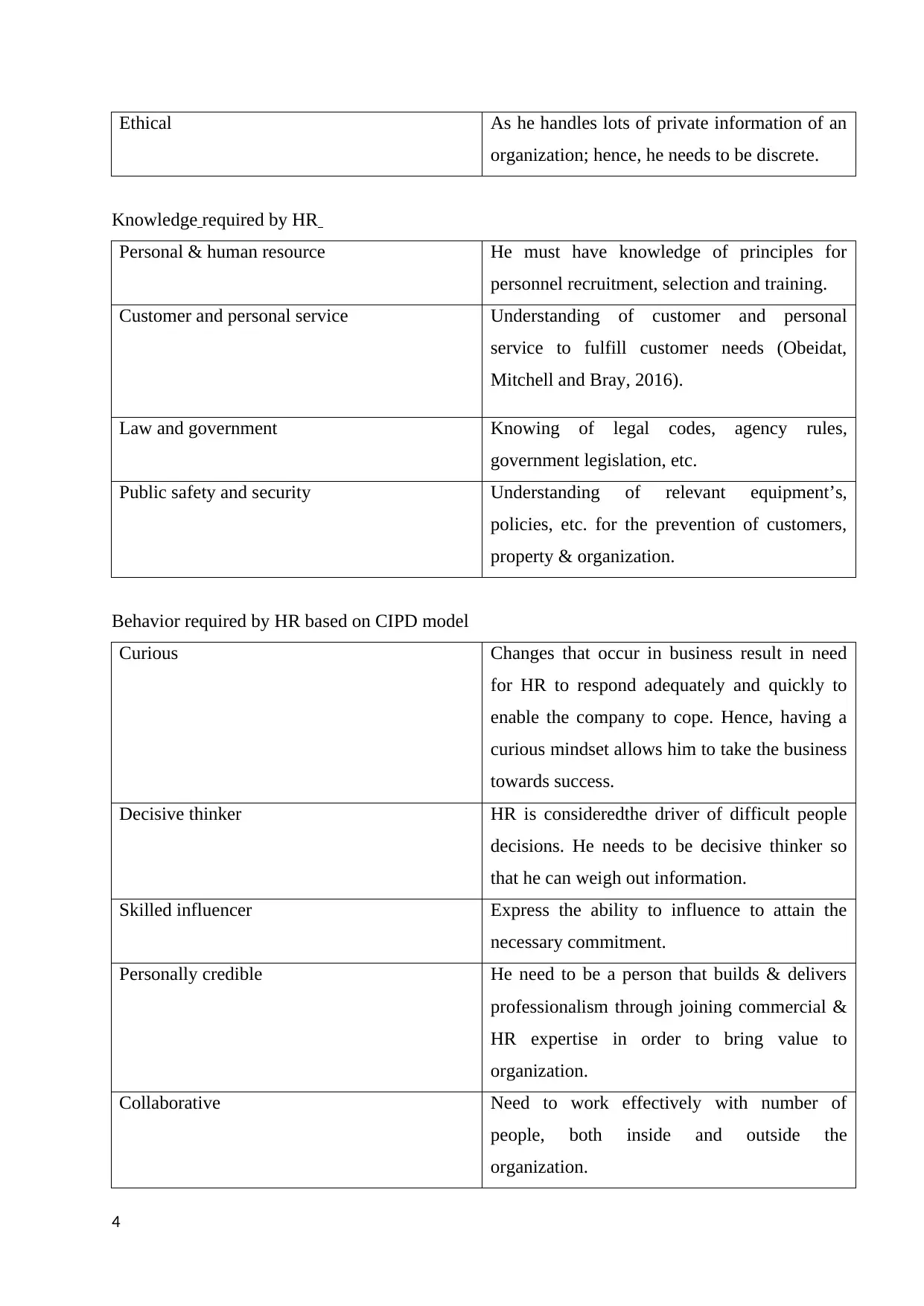
Ethical As he handles lots of private information of an
organization; hence, he needs to be discrete.
Knowledge required by HR
Personal & human resource He must have knowledge of principles for
personnel recruitment, selection and training.
Customer and personal service Understanding of customer and personal
service to fulfill customer needs (Obeidat,
Mitchell and Bray, 2016).
Law and government Knowing of legal codes, agency rules,
government legislation, etc.
Public safety and security Understanding of relevant equipment’s,
policies, etc. for the prevention of customers,
property & organization.
Behavior required by HR based on CIPD model
Curious Changes that occur in business result in need
for HR to respond adequately and quickly to
enable the company to cope. Hence, having a
curious mindset allows him to take the business
towards success.
Decisive thinker HR is consideredthe driver of difficult people
decisions. He needs to be decisive thinker so
that he can weigh out information.
Skilled influencer Express the ability to influence to attain the
necessary commitment.
Personally credible He need to be a person that builds & delivers
professionalism through joining commercial &
HR expertise in order to bring value to
organization.
Collaborative Need to work effectively with number of
people, both inside and outside the
organization.
4
organization; hence, he needs to be discrete.
Knowledge required by HR
Personal & human resource He must have knowledge of principles for
personnel recruitment, selection and training.
Customer and personal service Understanding of customer and personal
service to fulfill customer needs (Obeidat,
Mitchell and Bray, 2016).
Law and government Knowing of legal codes, agency rules,
government legislation, etc.
Public safety and security Understanding of relevant equipment’s,
policies, etc. for the prevention of customers,
property & organization.
Behavior required by HR based on CIPD model
Curious Changes that occur in business result in need
for HR to respond adequately and quickly to
enable the company to cope. Hence, having a
curious mindset allows him to take the business
towards success.
Decisive thinker HR is consideredthe driver of difficult people
decisions. He needs to be decisive thinker so
that he can weigh out information.
Skilled influencer Express the ability to influence to attain the
necessary commitment.
Personally credible He need to be a person that builds & delivers
professionalism through joining commercial &
HR expertise in order to bring value to
organization.
Collaborative Need to work effectively with number of
people, both inside and outside the
organization.
4
Paraphrase This Document
Need a fresh take? Get an instant paraphrase of this document with our AI Paraphraser
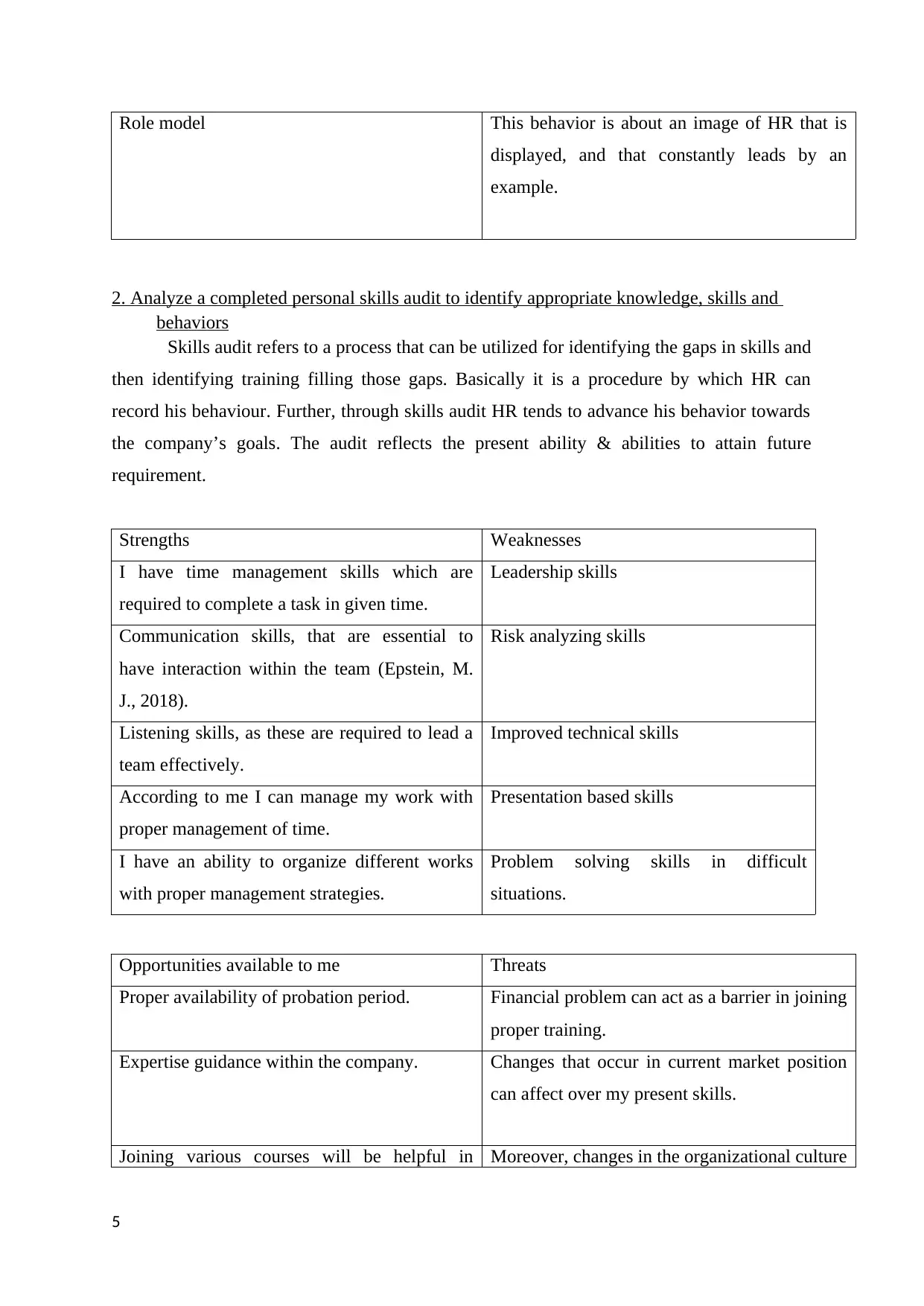
Role model This behavior is about an image of HR that is
displayed, and that constantly leads by an
example.
2. Analyze a completed personal skills audit to identify appropriate knowledge, skills and
behaviors
Skills audit refers to a process that can be utilized for identifying the gaps in skills and
then identifying training filling those gaps. Basically it is a procedure by which HR can
record his behaviour. Further, through skills audit HR tends to advance his behavior towards
the company’s goals. The audit reflects the present ability & abilities to attain future
requirement.
Strengths Weaknesses
I have time management skills which are
required to complete a task in given time.
Leadership skills
Communication skills, that are essential to
have interaction within the team (Epstein, M.
J., 2018).
Risk analyzing skills
Listening skills, as these are required to lead a
team effectively.
Improved technical skills
According to me I can manage my work with
proper management of time.
Presentation based skills
I have an ability to organize different works
with proper management strategies.
Problem solving skills in difficult
situations.
Opportunities available to me Threats
Proper availability of probation period. Financial problem can act as a barrier in joining
proper training.
Expertise guidance within the company. Changes that occur in current market position
can affect over my present skills.
Joining various courses will be helpful in Moreover, changes in the organizational culture
5
displayed, and that constantly leads by an
example.
2. Analyze a completed personal skills audit to identify appropriate knowledge, skills and
behaviors
Skills audit refers to a process that can be utilized for identifying the gaps in skills and
then identifying training filling those gaps. Basically it is a procedure by which HR can
record his behaviour. Further, through skills audit HR tends to advance his behavior towards
the company’s goals. The audit reflects the present ability & abilities to attain future
requirement.
Strengths Weaknesses
I have time management skills which are
required to complete a task in given time.
Leadership skills
Communication skills, that are essential to
have interaction within the team (Epstein, M.
J., 2018).
Risk analyzing skills
Listening skills, as these are required to lead a
team effectively.
Improved technical skills
According to me I can manage my work with
proper management of time.
Presentation based skills
I have an ability to organize different works
with proper management strategies.
Problem solving skills in difficult
situations.
Opportunities available to me Threats
Proper availability of probation period. Financial problem can act as a barrier in joining
proper training.
Expertise guidance within the company. Changes that occur in current market position
can affect over my present skills.
Joining various courses will be helpful in Moreover, changes in the organizational culture
5
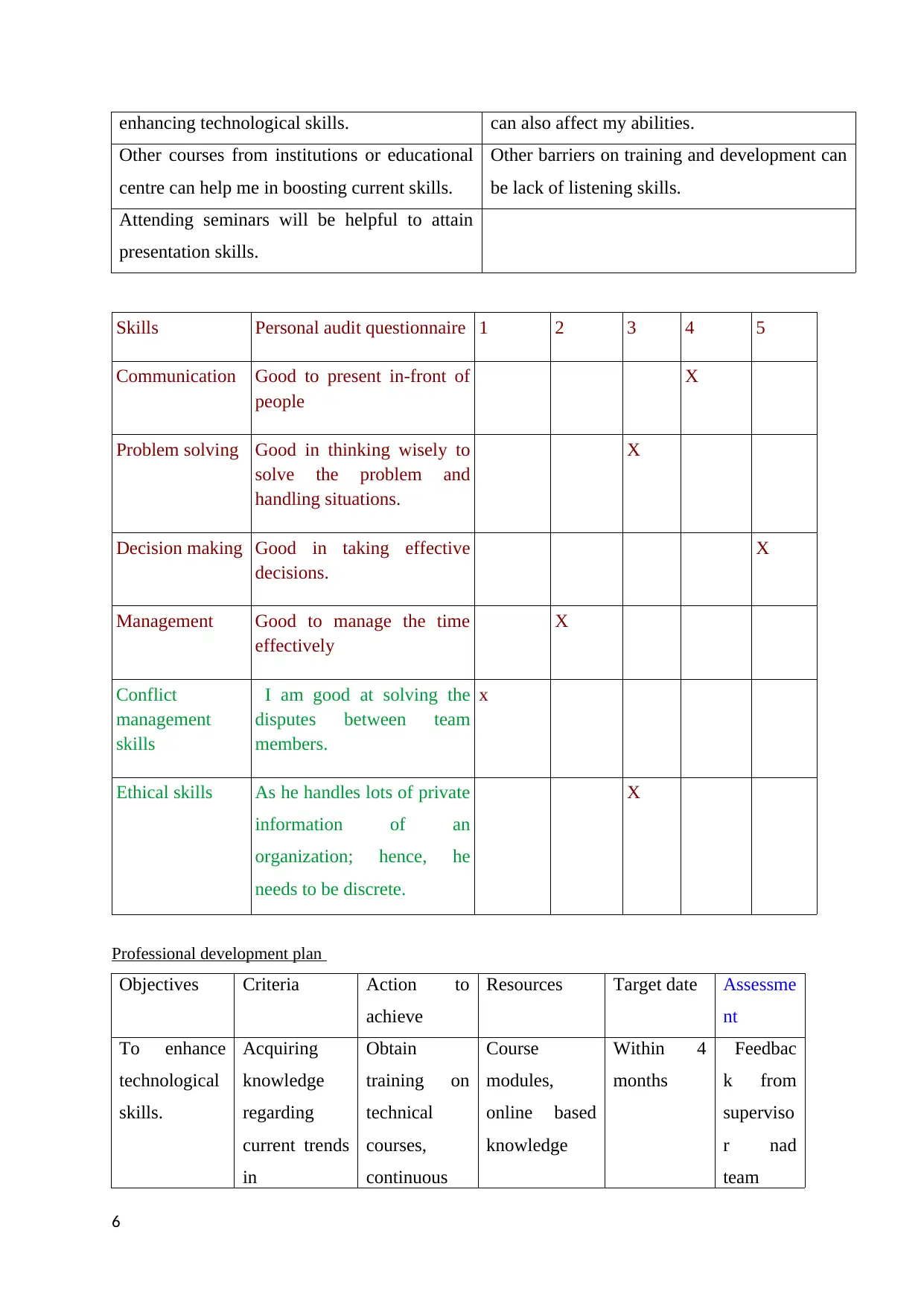
enhancing technological skills. can also affect my abilities.
Other courses from institutions or educational
centre can help me in boosting current skills.
Other barriers on training and development can
be lack of listening skills.
Attending seminars will be helpful to attain
presentation skills.
Skills Personal audit questionnaire 1 2 3 4 5
Communication Good to present in-front of
people
X
Problem solving Good in thinking wisely to
solve the problem and
handling situations.
X
Decision making Good in taking effective
decisions.
X
Management Good to manage the time
effectively
X
Conflict
management
skills
I am good at solving the
disputes between team
members.
x
Ethical skills As he handles lots of private
information of an
organization; hence, he
needs to be discrete.
X
Professional development plan
Objectives Criteria Action to
achieve
Resources Target date Assessme
nt
To enhance
technological
skills.
Acquiring
knowledge
regarding
current trends
in
Obtain
training on
technical
courses,
continuous
Course
modules,
online based
knowledge
Within 4
months
Feedbac
k from
superviso
r nad
team
6
Other courses from institutions or educational
centre can help me in boosting current skills.
Other barriers on training and development can
be lack of listening skills.
Attending seminars will be helpful to attain
presentation skills.
Skills Personal audit questionnaire 1 2 3 4 5
Communication Good to present in-front of
people
X
Problem solving Good in thinking wisely to
solve the problem and
handling situations.
X
Decision making Good in taking effective
decisions.
X
Management Good to manage the time
effectively
X
Conflict
management
skills
I am good at solving the
disputes between team
members.
x
Ethical skills As he handles lots of private
information of an
organization; hence, he
needs to be discrete.
X
Professional development plan
Objectives Criteria Action to
achieve
Resources Target date Assessme
nt
To enhance
technological
skills.
Acquiring
knowledge
regarding
current trends
in
Obtain
training on
technical
courses,
continuous
Course
modules,
online based
knowledge
Within 4
months
Feedbac
k from
superviso
r nad
team
6
⊘ This is a preview!⊘
Do you want full access?
Subscribe today to unlock all pages.

Trusted by 1+ million students worldwide
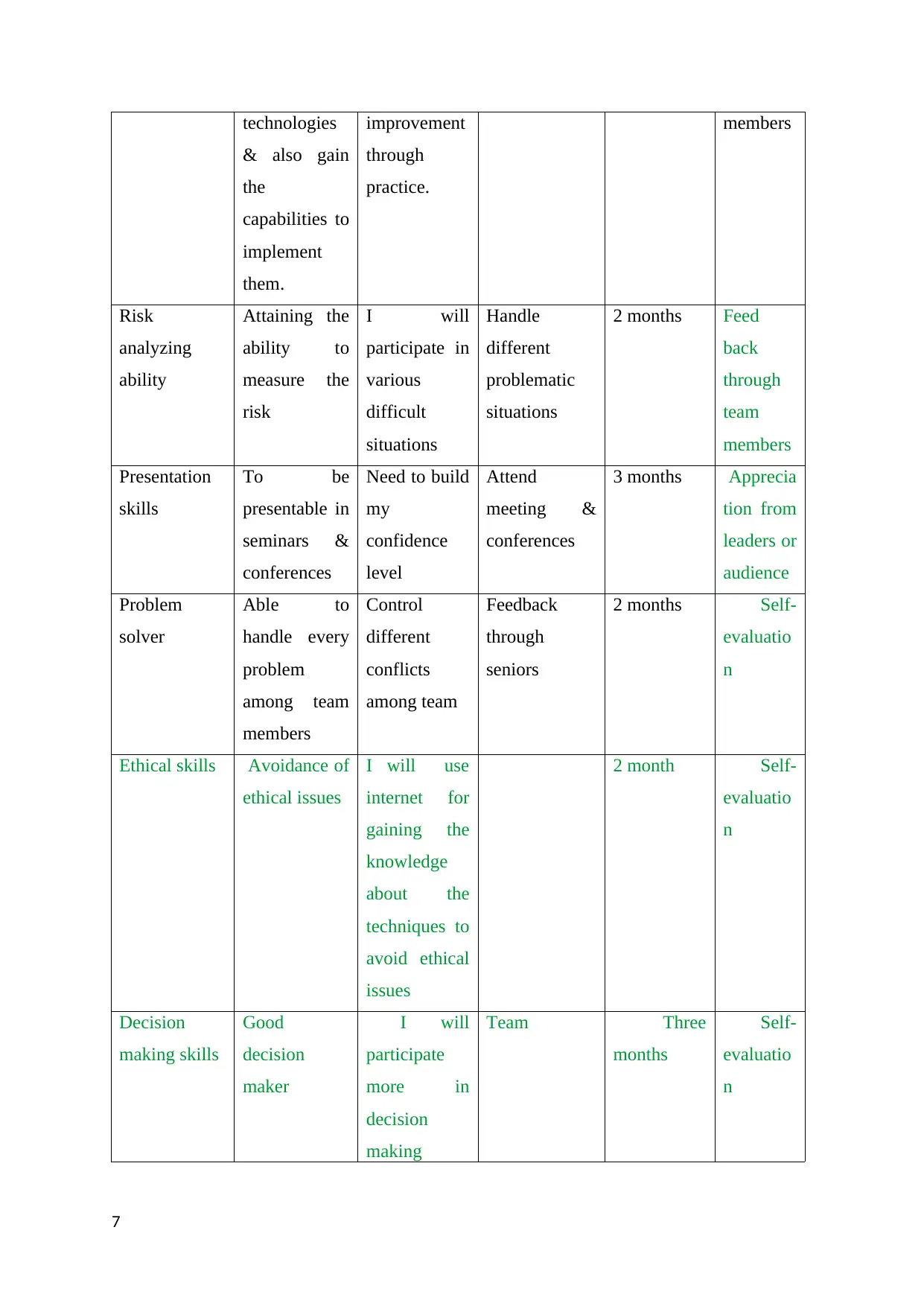
technologies
& also gain
the
capabilities to
implement
them.
improvement
through
practice.
members
Risk
analyzing
ability
Attaining the
ability to
measure the
risk
I will
participate in
various
difficult
situations
Handle
different
problematic
situations
2 months Feed
back
through
team
members
Presentation
skills
To be
presentable in
seminars &
conferences
Need to build
my
confidence
level
Attend
meeting &
conferences
3 months Apprecia
tion from
leaders or
audience
Problem
solver
Able to
handle every
problem
among team
members
Control
different
conflicts
among team
Feedback
through
seniors
2 months Self-
evaluatio
n
Ethical skills Avoidance of
ethical issues
I will use
internet for
gaining the
knowledge
about the
techniques to
avoid ethical
issues
2 month Self-
evaluatio
n
Decision
making skills
Good
decision
maker
I will
participate
more in
decision
making
Team Three
months
Self-
evaluatio
n
7
& also gain
the
capabilities to
implement
them.
improvement
through
practice.
members
Risk
analyzing
ability
Attaining the
ability to
measure the
risk
I will
participate in
various
difficult
situations
Handle
different
problematic
situations
2 months Feed
back
through
team
members
Presentation
skills
To be
presentable in
seminars &
conferences
Need to build
my
confidence
level
Attend
meeting &
conferences
3 months Apprecia
tion from
leaders or
audience
Problem
solver
Able to
handle every
problem
among team
members
Control
different
conflicts
among team
Feedback
through
seniors
2 months Self-
evaluatio
n
Ethical skills Avoidance of
ethical issues
I will use
internet for
gaining the
knowledge
about the
techniques to
avoid ethical
issues
2 month Self-
evaluatio
n
Decision
making skills
Good
decision
maker
I will
participate
more in
decision
making
Team Three
months
Self-
evaluatio
n
7
Paraphrase This Document
Need a fresh take? Get an instant paraphrase of this document with our AI Paraphraser
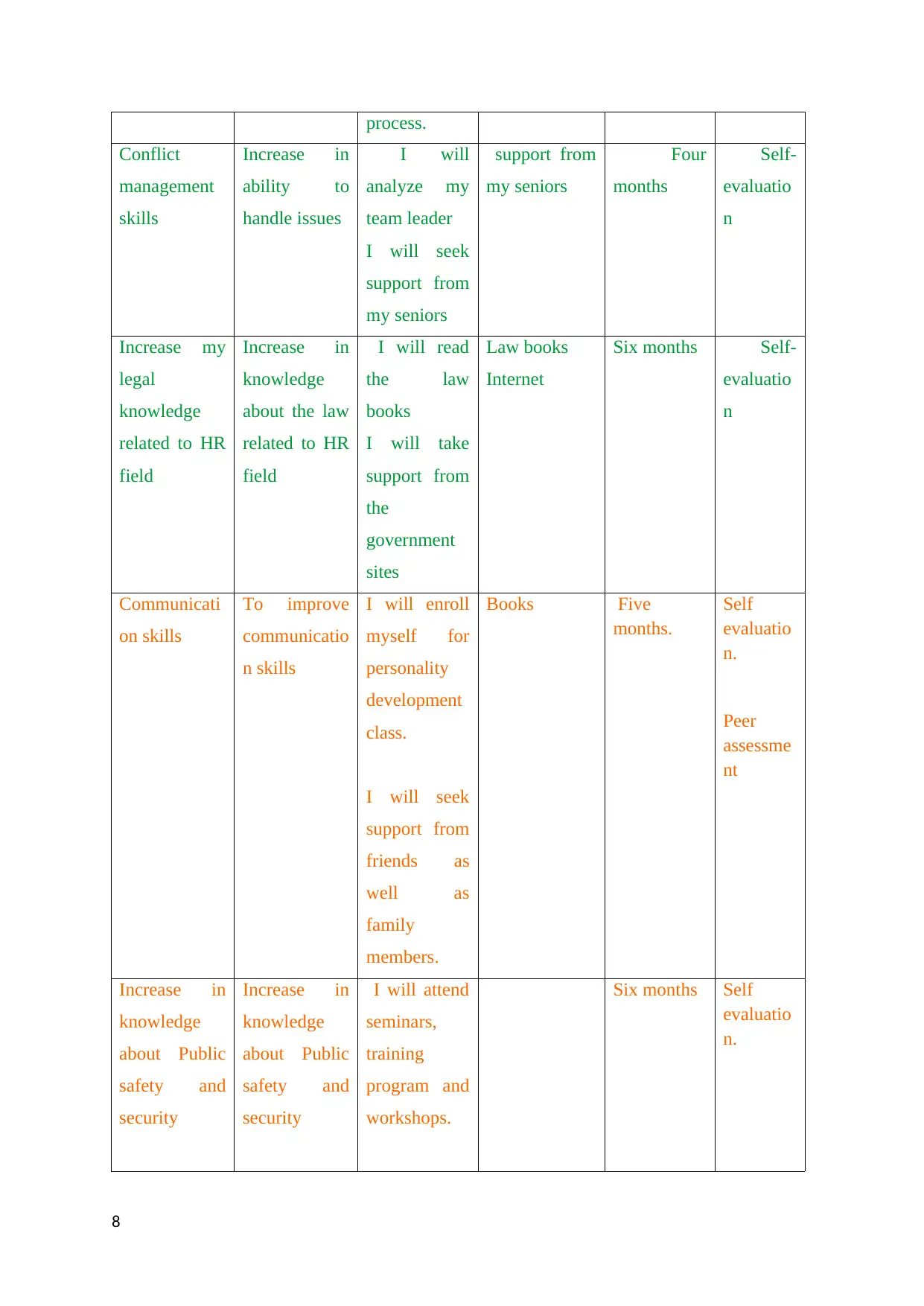
process.
Conflict
management
skills
Increase in
ability to
handle issues
I will
analyze my
team leader
I will seek
support from
my seniors
support from
my seniors
Four
months
Self-
evaluatio
n
Increase my
legal
knowledge
related to HR
field
Increase in
knowledge
about the law
related to HR
field
I will read
the law
books
I will take
support from
the
government
sites
Law books
Internet
Six months Self-
evaluatio
n
Communicati
on skills
To improve
communicatio
n skills
I will enroll
myself for
personality
development
class.
I will seek
support from
friends as
well as
family
members.
Books Five
months.
Self
evaluatio
n.
Peer
assessme
nt
Increase in
knowledge
about Public
safety and
security
Increase in
knowledge
about Public
safety and
security
I will attend
seminars,
training
program and
workshops.
Six months Self
evaluatio
n.
8
Conflict
management
skills
Increase in
ability to
handle issues
I will
analyze my
team leader
I will seek
support from
my seniors
support from
my seniors
Four
months
Self-
evaluatio
n
Increase my
legal
knowledge
related to HR
field
Increase in
knowledge
about the law
related to HR
field
I will read
the law
books
I will take
support from
the
government
sites
Law books
Internet
Six months Self-
evaluatio
n
Communicati
on skills
To improve
communicatio
n skills
I will enroll
myself for
personality
development
class.
I will seek
support from
friends as
well as
family
members.
Books Five
months.
Self
evaluatio
n.
Peer
assessme
nt
Increase in
knowledge
about Public
safety and
security
Increase in
knowledge
about Public
safety and
security
I will attend
seminars,
training
program and
workshops.
Six months Self
evaluatio
n.
8
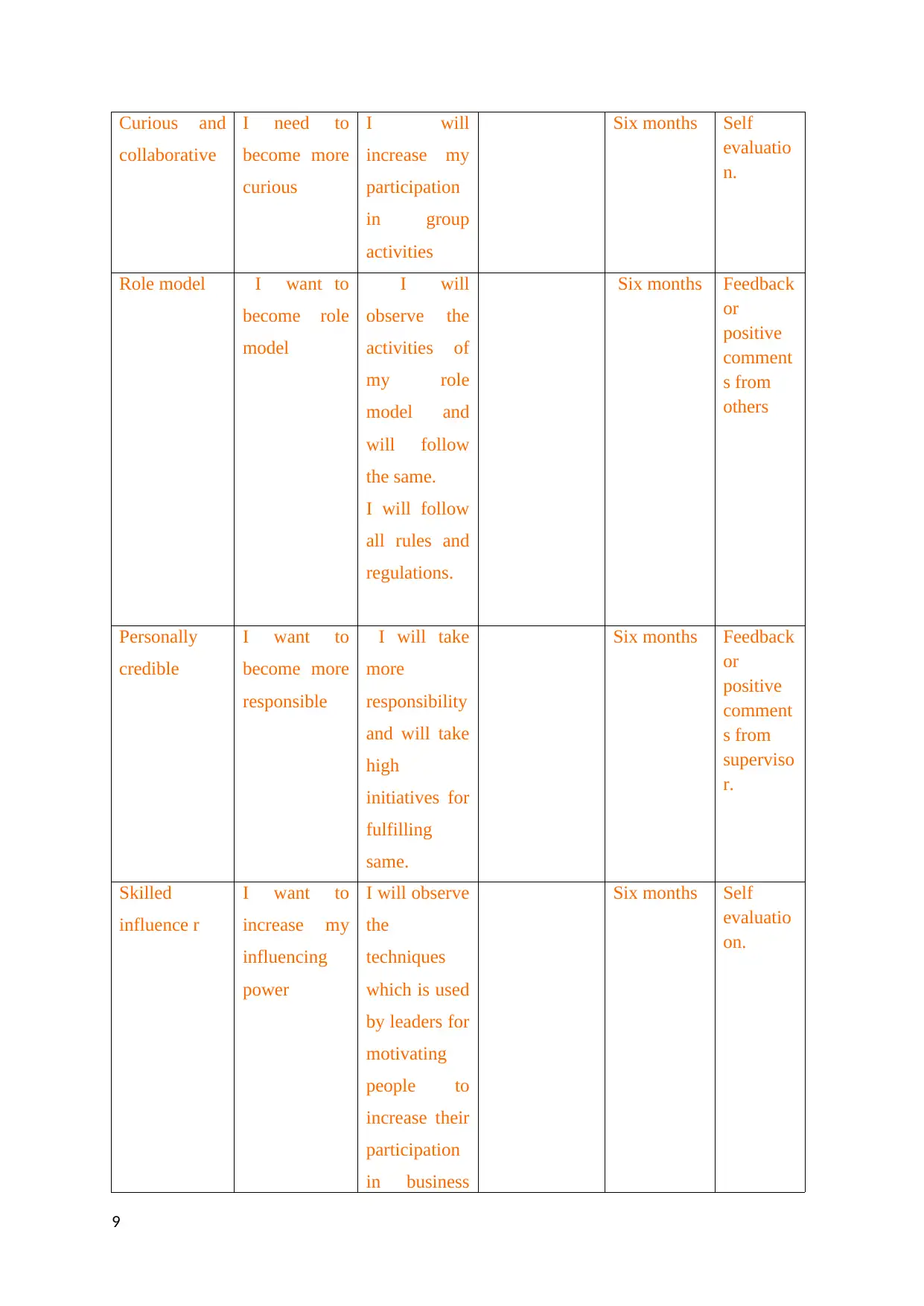
Curious and
collaborative
I need to
become more
curious
I will
increase my
participation
in group
activities
Six months Self
evaluatio
n.
Role model I want to
become role
model
I will
observe the
activities of
my role
model and
will follow
the same.
I will follow
all rules and
regulations.
Six months Feedback
or
positive
comment
s from
others
Personally
credible
I want to
become more
responsible
I will take
more
responsibility
and will take
high
initiatives for
fulfilling
same.
Six months Feedback
or
positive
comment
s from
superviso
r.
Skilled
influence r
I want to
increase my
influencing
power
I will observe
the
techniques
which is used
by leaders for
motivating
people to
increase their
participation
in business
Six months Self
evaluatio
on.
9
collaborative
I need to
become more
curious
I will
increase my
participation
in group
activities
Six months Self
evaluatio
n.
Role model I want to
become role
model
I will
observe the
activities of
my role
model and
will follow
the same.
I will follow
all rules and
regulations.
Six months Feedback
or
positive
comment
s from
others
Personally
credible
I want to
become more
responsible
I will take
more
responsibility
and will take
high
initiatives for
fulfilling
same.
Six months Feedback
or
positive
comment
s from
superviso
r.
Skilled
influence r
I want to
increase my
influencing
power
I will observe
the
techniques
which is used
by leaders for
motivating
people to
increase their
participation
in business
Six months Self
evaluatio
on.
9
⊘ This is a preview!⊘
Do you want full access?
Subscribe today to unlock all pages.

Trusted by 1+ million students worldwide
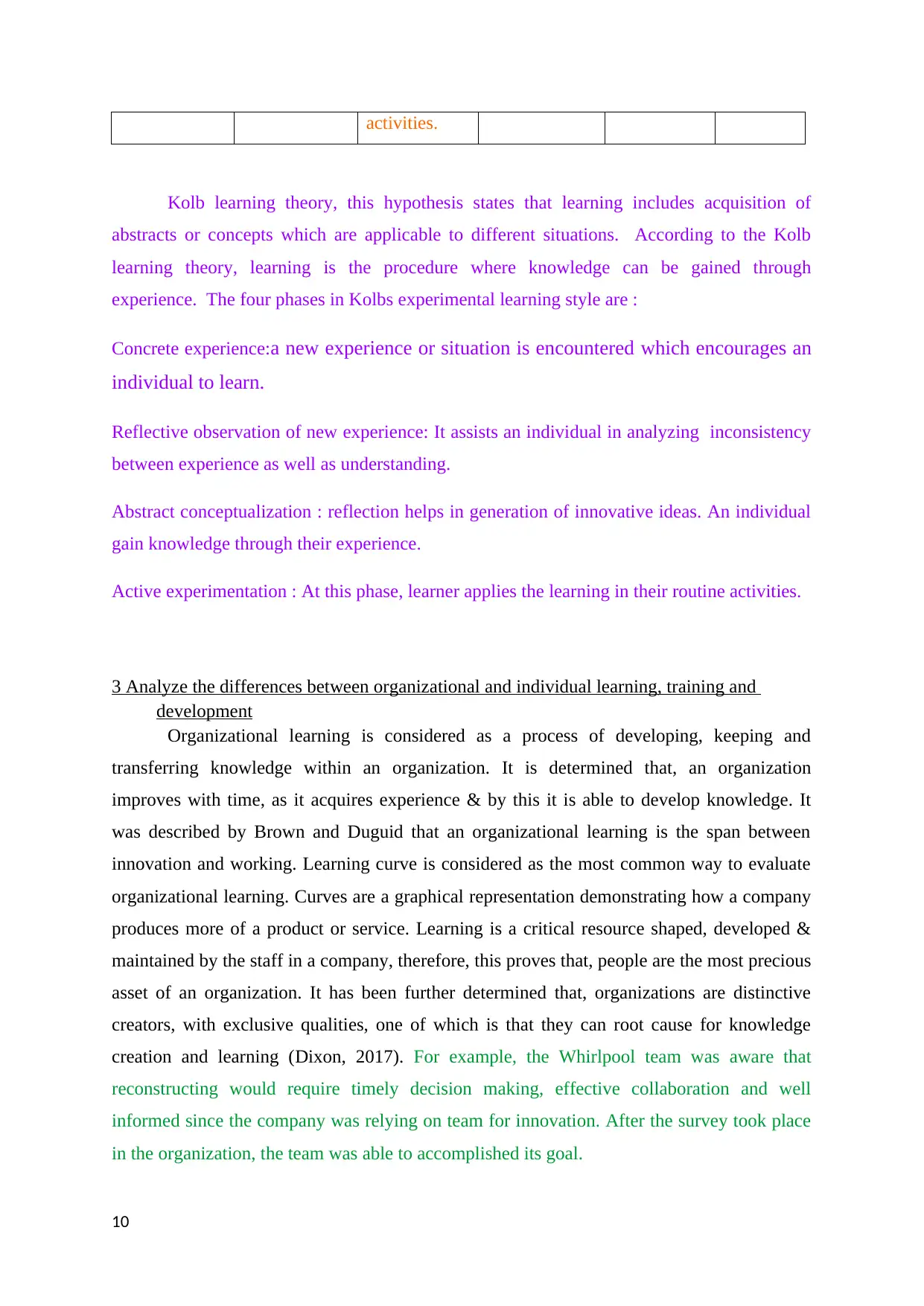
activities.
Kolb learning theory, this hypothesis states that learning includes acquisition of
abstracts or concepts which are applicable to different situations. According to the Kolb
learning theory, learning is the procedure where knowledge can be gained through
experience. The four phases in Kolbs experimental learning style are :
Concrete experience:a new experience or situation is encountered which encourages an
individual to learn.
Reflective observation of new experience: It assists an individual in analyzing inconsistency
between experience as well as understanding.
Abstract conceptualization : reflection helps in generation of innovative ideas. An individual
gain knowledge through their experience.
Active experimentation : At this phase, learner applies the learning in their routine activities.
3 Analyze the differences between organizational and individual learning, training and
development
Organizational learning is considered as a process of developing, keeping and
transferring knowledge within an organization. It is determined that, an organization
improves with time, as it acquires experience & by this it is able to develop knowledge. It
was described by Brown and Duguid that an organizational learning is the span between
innovation and working. Learning curve is considered as the most common way to evaluate
organizational learning. Curves are a graphical representation demonstrating how a company
produces more of a product or service. Learning is a critical resource shaped, developed &
maintained by the staff in a company, therefore, this proves that, people are the most precious
asset of an organization. It has been further determined that, organizations are distinctive
creators, with exclusive qualities, one of which is that they can root cause for knowledge
creation and learning (Dixon, 2017). For example, the Whirlpool team was aware that
reconstructing would require timely decision making, effective collaboration and well
informed since the company was relying on team for innovation. After the survey took place
in the organization, the team was able to accomplished its goal.
10
Kolb learning theory, this hypothesis states that learning includes acquisition of
abstracts or concepts which are applicable to different situations. According to the Kolb
learning theory, learning is the procedure where knowledge can be gained through
experience. The four phases in Kolbs experimental learning style are :
Concrete experience:a new experience or situation is encountered which encourages an
individual to learn.
Reflective observation of new experience: It assists an individual in analyzing inconsistency
between experience as well as understanding.
Abstract conceptualization : reflection helps in generation of innovative ideas. An individual
gain knowledge through their experience.
Active experimentation : At this phase, learner applies the learning in their routine activities.
3 Analyze the differences between organizational and individual learning, training and
development
Organizational learning is considered as a process of developing, keeping and
transferring knowledge within an organization. It is determined that, an organization
improves with time, as it acquires experience & by this it is able to develop knowledge. It
was described by Brown and Duguid that an organizational learning is the span between
innovation and working. Learning curve is considered as the most common way to evaluate
organizational learning. Curves are a graphical representation demonstrating how a company
produces more of a product or service. Learning is a critical resource shaped, developed &
maintained by the staff in a company, therefore, this proves that, people are the most precious
asset of an organization. It has been further determined that, organizations are distinctive
creators, with exclusive qualities, one of which is that they can root cause for knowledge
creation and learning (Dixon, 2017). For example, the Whirlpool team was aware that
reconstructing would require timely decision making, effective collaboration and well
informed since the company was relying on team for innovation. After the survey took place
in the organization, the team was able to accomplished its goal.
10
Paraphrase This Document
Need a fresh take? Get an instant paraphrase of this document with our AI Paraphraser
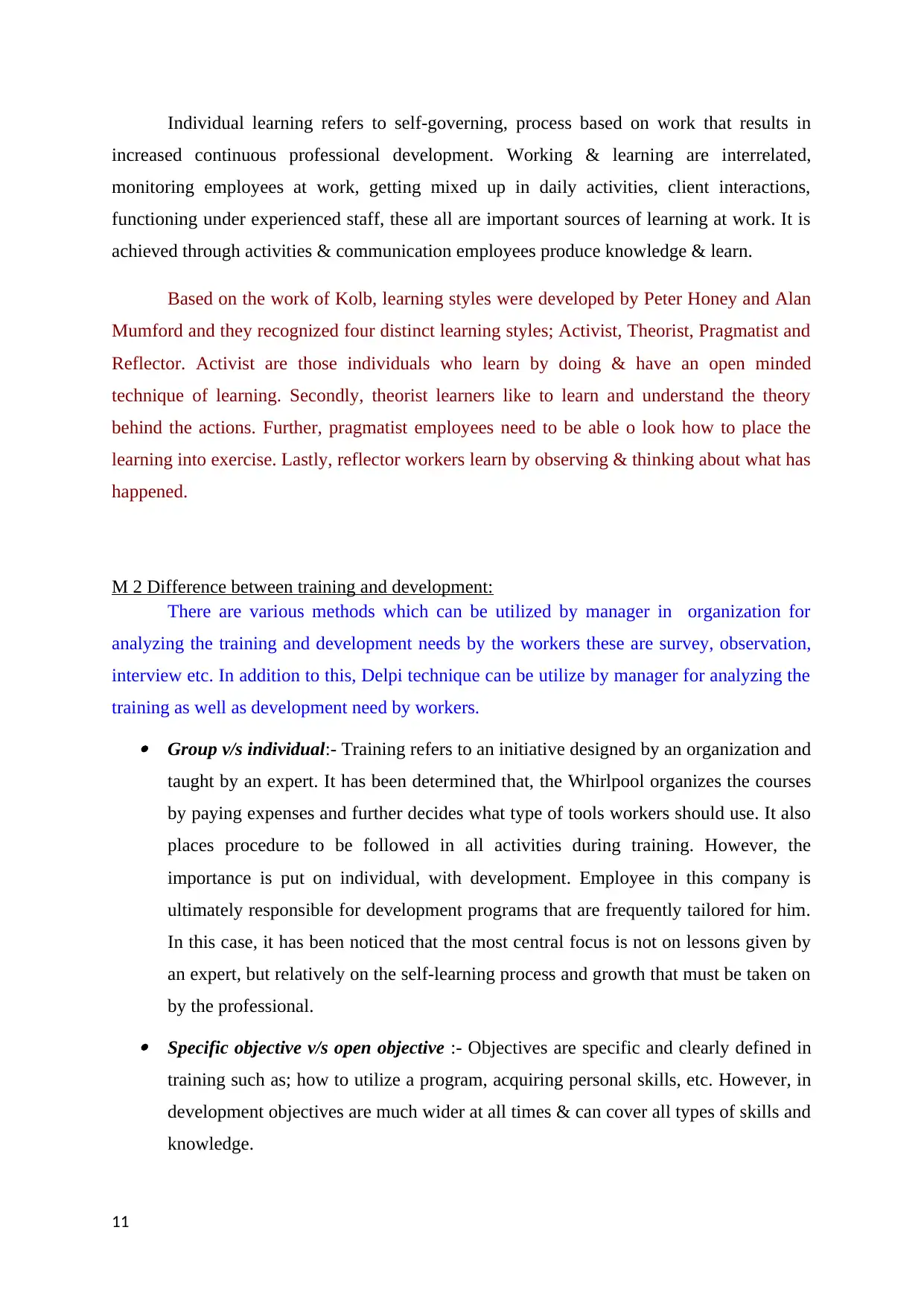
Individual learning refers to self-governing, process based on work that results in
increased continuous professional development. Working & learning are interrelated,
monitoring employees at work, getting mixed up in daily activities, client interactions,
functioning under experienced staff, these all are important sources of learning at work. It is
achieved through activities & communication employees produce knowledge & learn.
Based on the work of Kolb, learning styles were developed by Peter Honey and Alan
Mumford and they recognized four distinct learning styles; Activist, Theorist, Pragmatist and
Reflector. Activist are those individuals who learn by doing & have an open minded
technique of learning. Secondly, theorist learners like to learn and understand the theory
behind the actions. Further, pragmatist employees need to be able o look how to place the
learning into exercise. Lastly, reflector workers learn by observing & thinking about what has
happened.
M 2 Difference between training and development:
There are various methods which can be utilized by manager in organization for
analyzing the training and development needs by the workers these are survey, observation,
interview etc. In addition to this, Delpi technique can be utilize by manager for analyzing the
training as well as development need by workers. Group v/s individual:- Training refers to an initiative designed by an organization and
taught by an expert. It has been determined that, the Whirlpool organizes the courses
by paying expenses and further decides what type of tools workers should use. It also
places procedure to be followed in all activities during training. However, the
importance is put on individual, with development. Employee in this company is
ultimately responsible for development programs that are frequently tailored for him.
In this case, it has been noticed that the most central focus is not on lessons given by
an expert, but relatively on the self-learning process and growth that must be taken on
by the professional. Specific objective v/s open objective :- Objectives are specific and clearly defined in
training such as; how to utilize a program, acquiring personal skills, etc. However, in
development objectives are much wider at all times & can cover all types of skills and
knowledge.
11
increased continuous professional development. Working & learning are interrelated,
monitoring employees at work, getting mixed up in daily activities, client interactions,
functioning under experienced staff, these all are important sources of learning at work. It is
achieved through activities & communication employees produce knowledge & learn.
Based on the work of Kolb, learning styles were developed by Peter Honey and Alan
Mumford and they recognized four distinct learning styles; Activist, Theorist, Pragmatist and
Reflector. Activist are those individuals who learn by doing & have an open minded
technique of learning. Secondly, theorist learners like to learn and understand the theory
behind the actions. Further, pragmatist employees need to be able o look how to place the
learning into exercise. Lastly, reflector workers learn by observing & thinking about what has
happened.
M 2 Difference between training and development:
There are various methods which can be utilized by manager in organization for
analyzing the training and development needs by the workers these are survey, observation,
interview etc. In addition to this, Delpi technique can be utilize by manager for analyzing the
training as well as development need by workers. Group v/s individual:- Training refers to an initiative designed by an organization and
taught by an expert. It has been determined that, the Whirlpool organizes the courses
by paying expenses and further decides what type of tools workers should use. It also
places procedure to be followed in all activities during training. However, the
importance is put on individual, with development. Employee in this company is
ultimately responsible for development programs that are frequently tailored for him.
In this case, it has been noticed that the most central focus is not on lessons given by
an expert, but relatively on the self-learning process and growth that must be taken on
by the professional. Specific objective v/s open objective :- Objectives are specific and clearly defined in
training such as; how to utilize a program, acquiring personal skills, etc. However, in
development objectives are much wider at all times & can cover all types of skills and
knowledge.
11
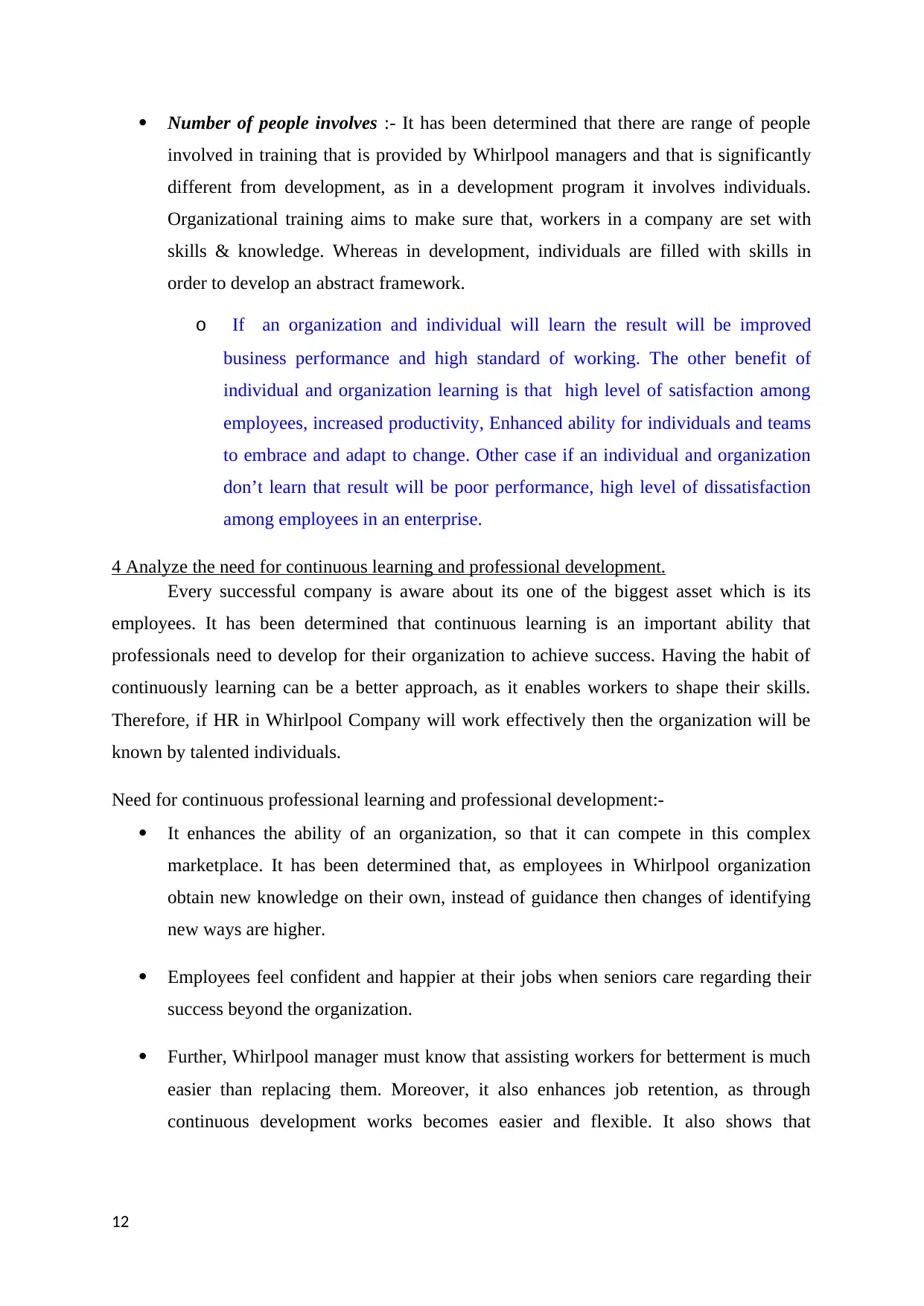
Number of people involves :- It has been determined that there are range of people
involved in training that is provided by Whirlpool managers and that is significantly
different from development, as in a development program it involves individuals.
Organizational training aims to make sure that, workers in a company are set with
skills & knowledge. Whereas in development, individuals are filled with skills in
order to develop an abstract framework.
o If an organization and individual will learn the result will be improved
business performance and high standard of working. The other benefit of
individual and organization learning is that high level of satisfaction among
employees, increased productivity, Enhanced ability for individuals and teams
to embrace and adapt to change. Other case if an individual and organization
don’t learn that result will be poor performance, high level of dissatisfaction
among employees in an enterprise.
4 Analyze the need for continuous learning and professional development.
Every successful company is aware about its one of the biggest asset which is its
employees. It has been determined that continuous learning is an important ability that
professionals need to develop for their organization to achieve success. Having the habit of
continuously learning can be a better approach, as it enables workers to shape their skills.
Therefore, if HR in Whirlpool Company will work effectively then the organization will be
known by talented individuals.
Need for continuous professional learning and professional development:-
It enhances the ability of an organization, so that it can compete in this complex
marketplace. It has been determined that, as employees in Whirlpool organization
obtain new knowledge on their own, instead of guidance then changes of identifying
new ways are higher.
Employees feel confident and happier at their jobs when seniors care regarding their
success beyond the organization.
Further, Whirlpool manager must know that assisting workers for betterment is much
easier than replacing them. Moreover, it also enhances job retention, as through
continuous development works becomes easier and flexible. It also shows that
12
involved in training that is provided by Whirlpool managers and that is significantly
different from development, as in a development program it involves individuals.
Organizational training aims to make sure that, workers in a company are set with
skills & knowledge. Whereas in development, individuals are filled with skills in
order to develop an abstract framework.
o If an organization and individual will learn the result will be improved
business performance and high standard of working. The other benefit of
individual and organization learning is that high level of satisfaction among
employees, increased productivity, Enhanced ability for individuals and teams
to embrace and adapt to change. Other case if an individual and organization
don’t learn that result will be poor performance, high level of dissatisfaction
among employees in an enterprise.
4 Analyze the need for continuous learning and professional development.
Every successful company is aware about its one of the biggest asset which is its
employees. It has been determined that continuous learning is an important ability that
professionals need to develop for their organization to achieve success. Having the habit of
continuously learning can be a better approach, as it enables workers to shape their skills.
Therefore, if HR in Whirlpool Company will work effectively then the organization will be
known by talented individuals.
Need for continuous professional learning and professional development:-
It enhances the ability of an organization, so that it can compete in this complex
marketplace. It has been determined that, as employees in Whirlpool organization
obtain new knowledge on their own, instead of guidance then changes of identifying
new ways are higher.
Employees feel confident and happier at their jobs when seniors care regarding their
success beyond the organization.
Further, Whirlpool manager must know that assisting workers for betterment is much
easier than replacing them. Moreover, it also enhances job retention, as through
continuous development works becomes easier and flexible. It also shows that
12
⊘ This is a preview!⊘
Do you want full access?
Subscribe today to unlock all pages.

Trusted by 1+ million students worldwide
1 out of 19
Related Documents
Your All-in-One AI-Powered Toolkit for Academic Success.
+13062052269
info@desklib.com
Available 24*7 on WhatsApp / Email
![[object Object]](/_next/static/media/star-bottom.7253800d.svg)
Unlock your academic potential
Copyright © 2020–2026 A2Z Services. All Rights Reserved. Developed and managed by ZUCOL.





